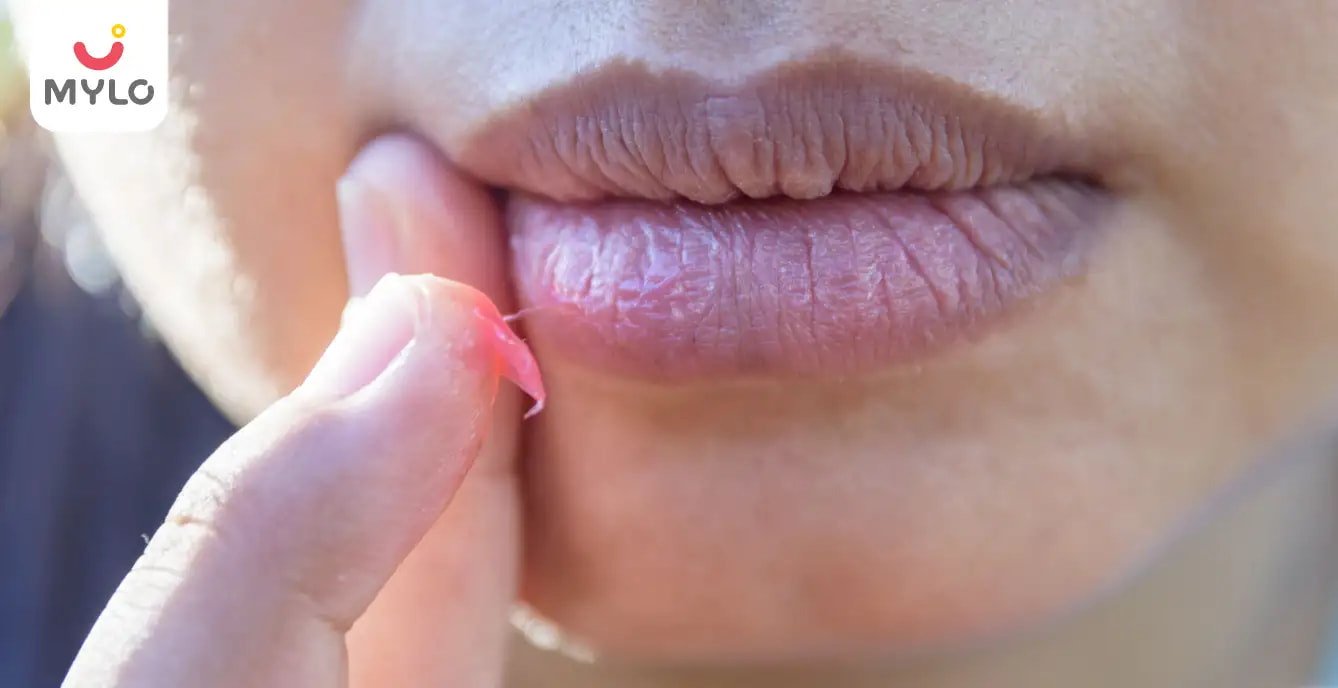Home

Dental Health

How Often Do Your Gums Begin to Bleed During Pregnancy?
In this Article

Dental Health
How Often Do Your Gums Begin to Bleed During Pregnancy?
Updated on 3 November 2023



Medically Reviewed by
Kusum Sabharwal
Obstetrician & Gynecologist - MBBS| DGO
View Profile

In the second trimester, expect to see a lot of blood on your toothbrush. Bleeding gums are a common sign and symptom during pregnancy. Inflammation of the gums is caused by the same hormones that cause mucus membranes to expand and sinuses to get clogged during pregnancy. This leads to bleeding gums, pregnancy gingivitis, and aching gums.
Causes of Bleeding Gums During Pregnancy
Pregnancy may cause swollen or bleeding gums during pregnancy and a painful mouth, but several possible reasons are:
Hormones are on the rise, causing gums to inflame. Hormones are the most likely cause, as expected. Also, your mouth will be prone to germs and plaque, which may cause gingivitis & tooth decay in certain women if not adequately managed during pregnancy.
1. Mouth and eating behavior shifts
Pregnant women may also produce less saliva and consume more sugary and carbohydrate-rich foods, providing a more favorable environment for plaque and cavities in their mouths.
2. Morning sickness causes a delayed response.
If you had morning sickness with vomiting, your teeth and gums might be experiencing the effects of the acid baths you had earlier in your pregnancy.
3. You've developed a newfound sensitivity.
Finally, when pregnant, you may be very sensitive to mint's aroma or flavor. It's not typical for pregnant women to have an allergy to oral care products. Still, research suggests this might explain why some don't brush and rinse as usual. A more acute gag reflex might be to blame for the swollen gum during pregnancy.
How long will bleeding gums during pregnancy persist?
According to the most significant research, pregnant women do not have an increased risk of bleeding gums sign or tooth decay. However, if you had healthy gums before pregnancy, they are likely to remain healthy.
When should I go to the doctor or the dentist if my gums are bleeding during pregnancy?
Gingivitis, or moderate inflammation of the gums, may cause your toothbrush to become pink or your rinse to spit blood. However, suppose your gums are bright red, excessively uncomfortable, and bleeding readily. In that case, you may have gum disease or mild inflammation of the gums.
Periodontitis is a more severe but manageable illness that may develop from untreated gingivitis. According to studies, premature labor, low birth weight babies, and even hypertension have been linked to periodontitis during pregnancy.
See your dentist if you find bleeding gums during pregnancy. A pregnancy tumor, also known as a canker sore, is the most probable cause of the sore, which is entirely innocuous.
It is estimated that roughly 5% of pregnant women have these red lumps on their gums. Still, there is a treatment for pregnancy gingivitis. It should go away on its own after birth. Still, surgery may be necessary if it persists or becomes bothersome before then.
Treatment for Bleeding Gums During Pregnancy
If you have bleeding gums during pregnancy, follow these simple steps for relief:
1. Floss
It's easy to skip flossing when you're exhausted from pregnancy alone, but it's essential. The food caught between your teeth may be removed by brushing your teeth.
2. Mouthwash
Use an alcohol-free mouthwash if you have trouble brushing and flossing your teeth or want to improve your teeth' health even more.
3. Maintain a low-sugar diet.
Excess sugar and healthy teeth are incompatible. Despite your desires, you may want to restrict your sugar consumption and instead munch on fruits and vegetables suitable for your gums.
4. Prenatal vitamins should be taken.
Gum health benefits significantly from vitamin C. Calcium is essential for healthy teeth and bones. Prenatal vitamins and foods that are excellent during pregnancy, such as milk and fruit, frequently include them.
5. Make an appointment with the dentist.
Even if you're apprehensive about having someone operate near your sensitive gums, visit the dentist regularly. Getting a dental checkup is the best method to keep track of what's going on in your mouth. To prevent unnecessary X-rays and anesthetics, notify your dentist if you're pregnant, even if it's not readily apparent. Visiting a dentist during the second trimester is usually the ideal time.
6. Practice good oral hygiene
Brush your teeth twice a day and floss daily to remove plaque and prevent the buildup of bacteria in your mouth.
7. Rinse with salt water
Rinse your mouth with warm salt water several times a day to help reduce inflammation and promote healing.
8. Use a soft-bristled toothbrush
A soft-bristled toothbrush can help prevent further irritation to your gums.
9. Eat a balanced diet
Eating a balanced diet that is rich in vitamins and minerals can help support healthy gums.
10. Visit your dentist regularly
Regular dental check-ups and cleanings can help prevent and treat gum problems before they become more severe.
If your gum problems persist or become more severe, be sure to talk to your healthcare provider or dentist for further advice and treatment.
Final Words
The gums may become inflamed and bleed during pregnancy for confident women. Plaque on the teeth is the primary cause of bleeding gums.
Gum disease is more common during pregnancy because of hormonal changes. It's also known as pregnant gum disease or pregnancy gingivitis.





Medically Reviewed by
Kusum Sabharwal
Obstetrician & Gynecologist - MBBS| DGO
View Profile


Written by
Mittali Khurana
Mittali is a content writer by profession. She is a dynamic writer with 04+ years of experience in content writing for E-commerce, Parenting App & Websites, SEO.
Read MoreGet baby's diet chart, and growth tips

Related Articles
Related Topics
RECENTLY PUBLISHED ARTICLES
our most recent articles

Diet & Nutrition
গর্ভাবস্থায় আলুবোখরা: উপকারিতা ও ঝুঁকি | Prunes During Pregnancy: Benefits & Risks in Bengali

Diet & Nutrition
গর্ভাবস্থায় হিং | ঝুঁকি, সুবিধা এবং অন্যান্য চিকিৎসা | Hing During Pregnancy | Risks, Benefits & Other Treatments in Bengali

Women Specific Issues
স্তনের উপর সাদা দাগ: লক্ষণ, কারণ এবং চিকিৎসা | White Spots on Nipple: Causes, Symptoms, and Treatments in Bengali

Diet & Nutrition
গর্ভাবস্থায় পোহা: উপকারিতা, ধরণ এবং রেসিপি | Poha During Pregnancy: Benefits, Types & Recipes in Bengali

Diet & Nutrition
গর্ভাবস্থায় মাছ: উপকারিতা এবং ঝুঁকি | Fish In Pregnancy: Benefits and Risks in Bengali

Diet & Nutrition
গর্ভাবস্থায় রেড ওয়াইন: পার্শ্ব প্রতিক্রিয়া এবং নির্দেশিকা | Red Wine During Pregnancy: Side Effects & Guidelines in Bengali
- ইনার থাই চ্যাফিং: কারণ, উপসর্গ এবং চিকিৎসা | Inner Thigh Chafing: Causes, Symptoms & Treatment in Bengali
- গর্ভাবস্থায় ব্রাউন রাইস: উপকারিতা ও সতর্কতা | Brown Rice During Pregnancy: Benefits & Precautions in Bengali
- Velamentous Cord Insertion - Precautions, Results & Safety
- Unlock the Secret to Flawless Skin: 7 Must-Have Qualities in a Face Serum
- Unlock the Secret to Radiant Skin: How Vitamin C Serum Can Transform Your Complexion
- Gender No Bar: 10 Reasons Why Everyone Needs a Body Lotion
- Unlock the Secret to Radiant Skin How to Choose the Perfect Body Lotion for Your Skin Type
- Top 10 Reasons to Apply a Body Lotion After Every Bath
- Communication in Toddlers: Milestones & Activities
- How to Improve Vocabulary for Toddlers?
- A Comprehensive Guide to Understanding Placenta Accreta
- Vulvovaginitis in Toddlers Causes, Symptoms and Treatment
- A Comprehensive Guide to Understanding Cerebral Palsy in Children
- Bitter Taste in Mouth During Pregnancy: Understanding the Causes and Remedies


AWARDS AND RECOGNITION

Mylo wins Forbes D2C Disruptor award

Mylo wins The Economic Times Promising Brands 2022
AS SEEN IN

- Mylo Care: Effective and science-backed personal care and wellness solutions for a joyful you.
- Mylo Baby: Science-backed, gentle and effective personal care & hygiene range for your little one.
- Mylo Community: Trusted and empathetic community of 10mn+ parents and experts.
Product Categories
baby carrier | baby soap | baby wipes | stretch marks cream | baby cream | baby shampoo | baby massage oil | baby hair oil | stretch marks oil | baby body wash | baby powder | baby lotion | diaper rash cream | newborn diapers | teether | baby kajal | baby diapers | cloth diapers |








